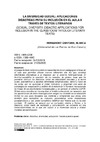Identificador persistente para citar o vincular este elemento:
https://accedacris.ulpgc.es/jspui/handle/10553/74238
| Campo DC | Valor | idioma |
|---|---|---|
| dc.contributor.author | Hernández Quintana, Blanca Ángeles | en_US |
| dc.date.accessioned | 2020-09-03T10:20:42Z | - |
| dc.date.available | 2020-09-03T10:20:42Z | - |
| dc.date.issued | 2020 | en_US |
| dc.identifier.issn | 1889-4208 | en_US |
| dc.identifier.other | Dialnet | - |
| dc.identifier.uri | https://accedacris.ulpgc.es/handle/10553/74238 | - |
| dc.description.abstract | El presente texto reflexiona sobre la necesidad de incluir pedagogías críticas en el aula que permitan ofrecer nuevos referentes con los que construir identidades alternativas a la impuesta por el sistema heteropatriarcal. El feminismo posibilita la aparición de los estudios de género, base que ha permitido articular los discursos sobre las identidades sexuales y la teoría queer, que visibilizan a aquellas identidades estigmatizadas, dentro y fuera de las aulas, por no ajustarse al orden normativo, y proponen una serie de estrategias de recuperación y análisis de la historia de la literatura incorporando la mirada de los escritores/as homosexuales y, en general, al colectivo LGTBI. Si bien estos estudios se circunscriben al ámbito universitario, es necesario que las aportaciones de estas investigaciones tengan su correlato en la educación formal no solo para recuperar sus nombres y comprender sus obras, sino también para normalizar su inclusión, presentarlos como mecanismos paradigmáticos y, así, poder completar y visibilizar esa historia que no ha sido contada. El objetivo es apostar por un currículum abierto y flexivo, y la literatura, como medio de expresión y comunicación, se convierte en una herramienta idónea en la que dar cabida a la diversidad sexual y ofrecer modelos de identificación. | en_US |
| dc.description.abstract | The present text reflects on the need to include critical pedagogies in the classroom that allow offering new references with which to construct alternative identities to the one imposed by the heteropatriarchal system. Feminism enables the emergence of gender studies, the basis for articulating discourses on sexual identities and queer theory, which make visible those stigmatized identities, inside and outside the classroom, by not adjusting to the normative order, and propose a series of recovery strategies and analysis of the history of literature incorporating the gaze of homosexual writers and, in general, the LGTBI collective. Although these studies are confined to the university environment, it is necessary that the contributions of these investigations have their correlate in formal education not only to recover their names and understand their works, but also to normalize their inclusion, present them as paradigmatic mechanisms and, thus, to be able to complete and visualize that story that has not been told. The objective is to provide an open and flexible curriculum, and literature, as a means of expression and communication, becomes an ideal tool in which to accommodate sexual diversity and offer identification models. | en_US |
| dc.language | spa | en_US |
| dc.relation.ispartof | Revista De Educacion Inclusiva | en_US |
| dc.source | Revista de Educación Inclusiva [ISSN 1889-4208], v. 13 (1), p. 272-287 | en_US |
| dc.subject | 6202 Teoría, análisis y crítica literarias | en_US |
| dc.subject | 5801 Teoría y métodos educativos | en_US |
| dc.subject | 630109 Sociología de la literatura | en_US |
| dc.subject.other | Didáctica | en_US |
| dc.subject.other | Diversidad | en_US |
| dc.subject.other | Educación | en_US |
| dc.subject.other | Literatura | en_US |
| dc.subject.other | Teoría Queer | en_US |
| dc.subject.other | Didactics | en_US |
| dc.subject.other | Education | en_US |
| dc.subject.other | Diversity | en_US |
| dc.subject.other | Literature | en_US |
| dc.subject.other | Queer theory | en_US |
| dc.title | La diversidad sexual: aplicaciones didácticas para su inclusión en el aula a través de textos literarios | en_US |
| dc.title.alternative | Sexual diversity: didactic applications for inclusion in the classroom through literary texts | en_US |
| dc.type | info:eu-repo/semantics/Article | en_US |
| dc.type | Article | en_US |
| dc.identifier.url | http://dialnet.unirioja.es/servlet/articulo?codigo=7536705 | - |
| dc.description.lastpage | 287 | en_US |
| dc.identifier.issue | 1 | - |
| dc.description.firstpage | 272 | en_US |
| dc.relation.volume | 13 | en_US |
| dc.investigacion | Ciencias Sociales y Jurídicas | en_US |
| dc.type2 | Artículo | en_US |
| dc.contributor.authordialnetid | 334375 | - |
| dc.identifier.dialnet | 7536705ARTREV | - |
| dc.utils.revision | Sí | en_US |
| dc.identifier.ulpgc | Sí | es |
| dc.description.esci | ESCI | |
| dc.description.dialnetimpact | 0,0 | |
| dc.description.dialnetq | Q2 | |
| dc.description.dialnetd | D5 | |
| dc.description.erihplus | ERIH PLUS | |
| item.grantfulltext | open | - |
| item.fulltext | Con texto completo | - |
| crisitem.author.dept | GIR Pensamiento, Creación y Representación en el ámbito de los Estudios Culturales | - |
| crisitem.author.dept | Departamento de Didácticas Específicas | - |
| crisitem.author.orcid | 0000-0001-9848-213X | - |
| crisitem.author.parentorg | Departamento de Filología Hispánica, Clásica y de Estudios Árabes y Orientales | - |
| crisitem.author.fullName | Hernández Quintana, Blanca Ángeles | - |
| Colección: | Artículos | |
Visitas
228
actualizado el 15-ene-2026
Descargas
143
actualizado el 15-ene-2026
Google ScholarTM
Verifica
Comparte
Exporta metadatos
Los elementos en ULPGC accedaCRIS están protegidos por derechos de autor con todos los derechos reservados, a menos que se indique lo contrario.
